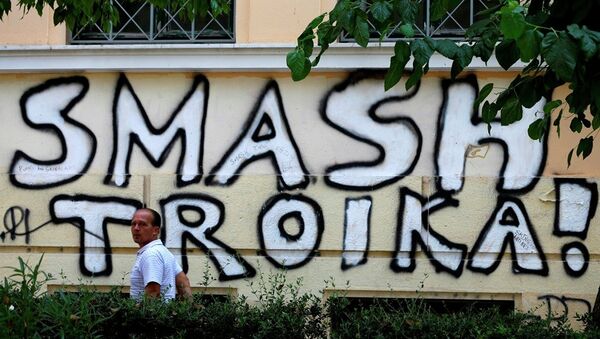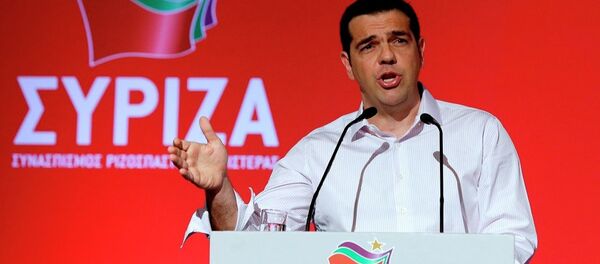Greek Prime Minister Alexis Tsipras is already under fire within his own party for having signed up to a new set of pre-conditions ahead of bailout negotiations which are harsher than those the Greek people rejected in the June referendum. Now he finds himself playing the part of a football being kicked about by the three members of the Troika, each arguing over the agenda.
IMF’s Lagarde: ‘Deeds, not creeds’ are what matters in Greece http://t.co/iUrgOAeZIx
— IMF (@IMFNews) July 29, 2015
The IMF has let it be known that it will not take part in a third bailout unless the whole bailout is sustainable in the medium term. The third $93 billion Greek bailout — which is yet to be negotiated and agreed — has been beset by a lack of trust between Athens and its creditors. Now, it appears, there is discord within the Troika itself.
The IMF declared on July 14 that:
"Greece's public debt has become highly unsustainable. The financing need through end-2018 is now estimated at $93 billion and debt is expected to peak at close to 200 percent of GDP in the next two years, Greece's debt can now only be made sustainable through debt relief measures that go far beyond what Europe has been willing to consider so far."
It has now emerged, on the fourth day of talks in Athens over the bailout, that the IMF is unwilling to pay a cent into the scheme unless debt relief — effectively writing off part of the Greek debt completely — is considered.
"Nothing Special for Greece"
The IMF Friday released a transcript of a conference call by an IMF official in Washington DC made on July 30, during which he said the IMF can only support a program that is "comprehensive". The IMF official said it could only take part in a program that ensures medium-term sustainability.
"And this is nothing special for Greece. It's a criterion we apply to all members, to all releases of IMF money, and we will, of course, also apply this in this case.
"What we have also said is that the Greek situation is very difficult. In order to ensure that sustainability, that medium-term sustainability, there's a need for difficult decisions on both sides and by both sides. I mean, difficult decisions in Greece regarding reforms, and difficult decisions for Greece's European partners about debt relief."
Referring to the fact that Greece is having to deal with three creditors, each with slightly differing agendas, he said: "You should not be under the illusion that just one side of it can fix the problem. Greece will not be in a medium-term sustainable position just on debt relief, and on the other hand, yet Greece cannot get into a medium-term sustainable position just on reforms of its own. It needs to be a combination of these two sets of issues.
"What is clear is that it will take some time before the two sides are ready to take these decisions, it was made clear at the meeting of European leaders a few weeks ago that they were not ready to consider the debt operation before the fall," the official said.
"So I think everybody understands that the IMF can only be in at that time when these decisions on these two sides are taken."
"There's nothing new here, nothing new on deciding to suddenly have a two-stage approach. It's always been clear that the IMF will only come in once these conditions are in place."





